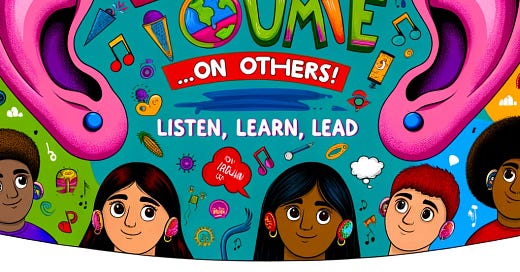👋 I challenge conventional thinking to help people craft well-rounded lives that blend career, caregiving and self-care.
To get all new Rule Breaker posts in your inbox, I suggest subscribing!
Welcome to the new Rule Breakers who joined the International Women’s Day gathering. It’s awesome to have you part of this crew now too!
We’re going live with another gathering on April 19 and talking about defining one-of-a-kind definition of success. Join us!
ve-year-old was born with a boombox in her belly. She is a non-stop talk radio station playing at high volume.
My two-year-old is completely different. She contents herself with a book, a blanket, and a seat by the window overlooking the mountains.
While they are completely different in how they communicate, both have something important to say and need different settings to be heard.
This made me think about Women's History Month, how societal voices are often prioritized or ignored and the rules for how we interact with each other.
Let’s explore.
Historically women have been shushed
For centuries women have been told to be quiet.
There are countless ways that women’s influence in society has been diminished. From patriarchal religions to 1950s housewife guides, women have been guided to take a back seat to the man’s role.
Prominence of the women’s voice has be relatively recent. It wasn’t until the 1920s that women gained the right to vote. At the end of the 1800s and early 1900s women were finally allowed to take on prominent professions such as lawyers and doctors.

Ancient history began being recorded some 5,000 years ago and so women have only really had a strong voice for about 3% of human history.
Now women are told to be loud
To counteract being left out of so much for so long, women are being encouraged to get loud.
We’ve followed the narrative that women need to be 'fixed' to achieve gender equality. Brand building, confidence boosting, leadership training and similar programs have become the en vogue silver bullet solutions of corporate DEI initiatives. Popular culture has pitched in too with Girl Boss messages meant to inspire and elevate a woman’s volume in our world.
We’ve come to believe that gender equality can be fixed by changing how 50% of our population shows up in the world.
What if the loudest got ‘shushed’ instead?
Here’s my contrary thought: what if we paused and said, “Shush. Let them speak”. Would we be further along in gender equality than any confidence-boosting, leadership training blah blah aimed at elevating women's status? I think yes.
These well-meaning efforts have inadvertently perpetuated existing disparities by framing women as the problem that needs fixing. As a result, women feel insufficient and the root cause societal norms and structures are left untouched.
Here's the thing – the inability to have your voice heard is not just a woman's thing. No matter how you slice it – by gender, race, mental health, personality type, citizenship status – the majority of people don't fall into the dominant culture and therefore lack a voice those in power are receptive to.
Pausing and shushing the loudest would make space for valuable insights, just like I need to do with my oldest so my little one can get her voice heard.

Practically speaking, how can this show up in our world? Here are some of my thoughts:
Review your personal podcast playlist to see how many men’s opinions you consume vs. women (or any other diverse perspective not reflected) and adjust accordingly
In meetings, note the quiet person who hasn’t shared their thoughts and invite them to do so (while also making sure others don’t interrupt)
If you organize sessions for women's professional development capabilities, also hold something for men (like diaper changing seminar done in Columbia)
Instead of solely encouraging girls to get loud, talk to everyone about the value of inviting diverse perspectives.
👉 What are your suggestions for how ‘shushing’ could be actioned? Share them in the comments!
There is a bigger theme in this one concept of shushing around what is at the root cause of gender inequality.
We have assumed it is women who are inadequate and need to be fixed. Instead, what if we started from a principle that women in and of themselves are great as they are, and it is the systems and norms that need to change? I have a feeling we'd be onto way different solutions and much more progress.
And this matters a whole ton because telling women that they are the problem only fuels self-loathing and feeling of not being enough. And that is not a great ingredient to a well-rounded life!
Keep well,
Jess
P.S. I’m prioritizing shipping over perfection, so this post may not convey all my thoughts perfectly. I’d love comments or questions to keep the discovery going.
P.P.S. With thanks, as always, to my Junior Associate, ChatGPT-4.0 AND Gemini Advanced







